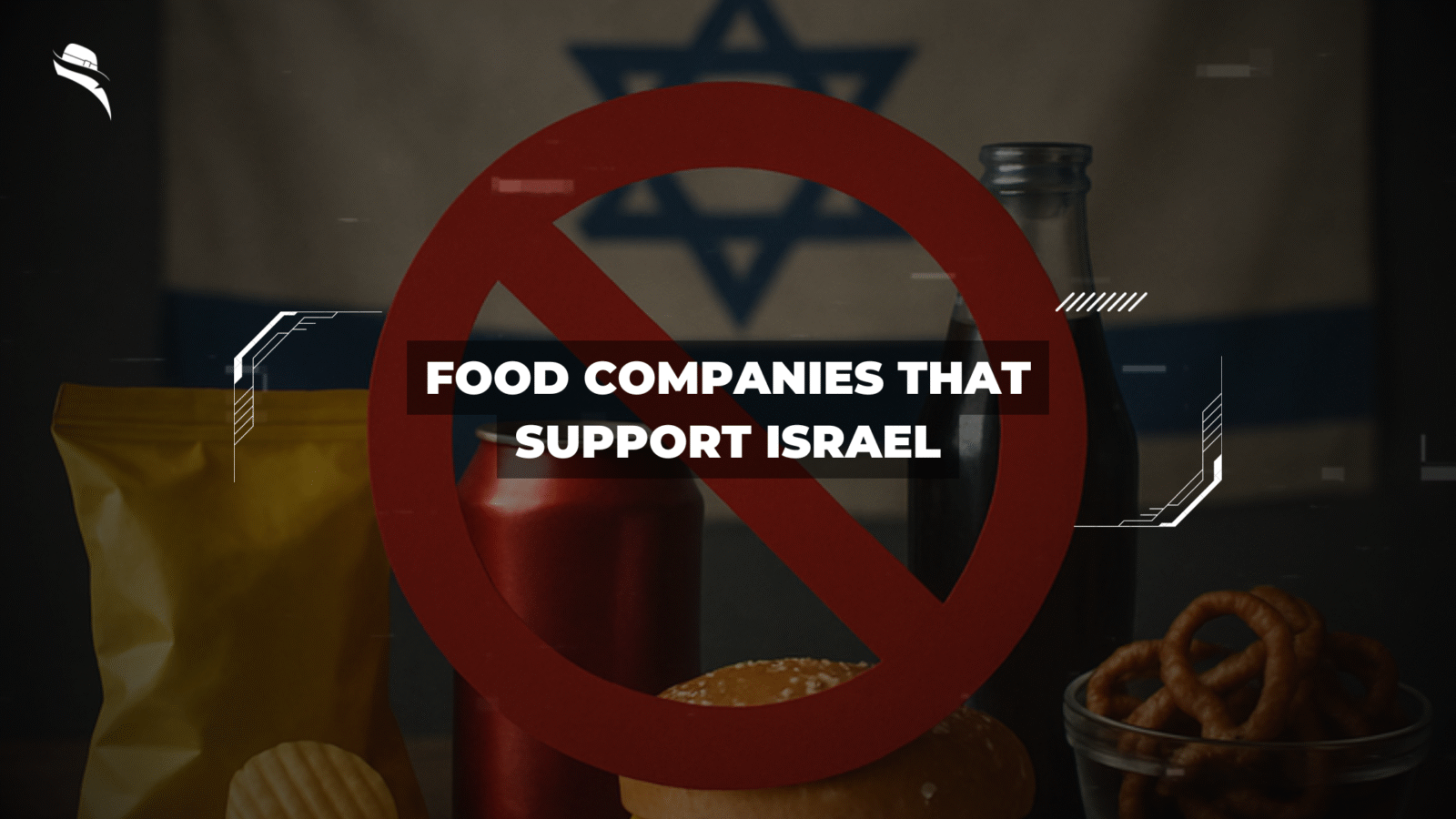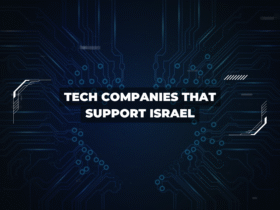Food companies that support Israel have become a focal point of consumer activism as boycott movements gain momentum worldwide. The BDS movement, utilizing targeted boycotts inspired by successful historical campaigns like the South African anti-apartheid movement and the US Civil Rights movement, has highlighted corporate complicity in regional conflicts.
Many well-known restaurants and food brands appear on boycott lists for various forms of support for Israel. For instance, McDonald’s Israeli franchise has donated more than 100,000 meals to Israeli security personnel, while Pizza Hut has provided free food to the Israeli military. Furthermore, the food and technology sectors contribute significantly to Israel’s economy, with technology alone accounting for 18.1% of Israel’s GDP and approximately 50% of its exports. Companies like Nestlé maintain a presence through investments in major Israeli food producers such as Osem. Meanwhile, Unilever circumvented Ben & Jerry’s decision to stop selling products in Israel by selling the distribution rights to an Israeli company.
This article examines the complex relationship between global food companies and the Israeli-Palestinian conflict, exploring how consumer choices can influence corporate behavior and political situations. Additionally, it provides a comprehensive list of food companies that support Israel and offers practical guidance for consumers seeking to make informed purchasing decisions.
Understanding the Role of Food Companies in the Conflict
The interconnection between global food companies and the Israeli-Palestinian conflict extends beyond simple business relationships. Major corporations often maintain complex operational structures that directly impact the political and economic landscape of the region.
How food companies are linked to Israeli operations
Corporate involvement in Israel takes various forms, ranging from direct investment to franchise operations. The United Nations has identified numerous companies with business ties to Israeli settlements in occupied Palestinian territories, including food conglomerates that operate both in the West Bank and represent a substantial part of Israel’s economy.
Several prominent examples illustrate this connection:
- Chinese Bright Dairy & Food owns a majority stake in Tnuva, Israel’s largest food conglomerate, which benefits from land seized from Palestinians in illegal outposts.
- Netafim, 80% owned by Mexico’s Orbia Advance Corporation, provides irrigation infrastructure that exploits water resources in the occupied West Bank.
- McDonald’s Israel locations advertised their decision to provide free and discounted meals to Israeli soldiers and rescue forces following October 7, giving away 100,000 free meals worth approximately 5 million shekels (USD 1.30 million).
In some cases, food companies have responded to pressure by changing their practices. General Mills was one of only two international companies removed from the UN’s updated list of businesses involved with Israeli settlements after withdrawing from these areas in June 2022.
Why consumer choices matter in political conflicts
Consumer purchasing decisions carry significant economic and political weight during conflicts. Research demonstrates that political tensions between countries can substantially impact consumer behavior, with one study showing that deteriorating US-China relations led to decreased visits to Chinese restaurants and increased patronage of traditional American establishments.
This pattern has been particularly evident in the boycott movements targeting companies perceived as supporting Israel. Starbucks reportedly lost USD 11 billion globally from boycotts stemming from a legal dispute with a workers’ union over a pro-Palestine social media post. Consequently, the company experienced a 15% drop in net income (to USD 772 million) compared to the previous year.
Other major food brands have faced similar consequences:
- McDonald’s reported its first quarterly sales miss in nearly four years, attributed to demand slumps in Middle Eastern stores and Muslim-majority countries.
- Americana Restaurants, which operates KFC, Pizza Hut, and Krispy Kreme across the Middle East, saw profits drop 40% in the second quarter of 2024.
- Starbucks Malaysia reported three consecutive falls in revenue across its 411 licensed stores, recording almost 50% revenue decline in the first quarter of the year.
The effectiveness of boycotts increases when they target companies playing a clear and direct role in Israel’s actions, as evidenced by successful campaigns against corporations like G4S, Veolia, Orange, Ben & Jerry’s, and Pillsbury. Through strategic consumer action, even large corporations can be compelled to reconsider their business practices in politically contested regions.
Strategic vs. Broad Boycotts: What Works Best
Boycott efforts against food companies that support Israel vary considerably in their focus and effectiveness. The difference between strategic, targeted boycotts and broad, unfocused ones often determines whether a campaign achieves meaningful results.
What is a targeted boycott?
A targeted boycott concentrates pressure on a select few entities rather than creating expansive lists of companies to avoid. The BDS movement exemplifies this approach by strategically boycotting companies where they believe they can achieve maximum impact—including HP, Chevron, Siemens, Carrefour, AXA, and Hyundai—while pursuing divestment campaigns against a broader range of businesses.
Effective targeted boycotts select companies based on specific criteria. First, they assess the level of complicity—for example, a company arming the Israeli military carries greater responsibility than one merely selling beauty products in Israel. Second, they consider whether targeting a particular company will generate substantial media coverage or solidarity from other movements. Finally, they evaluate the realistic chances of success before committing resources.
As research demonstrates, boycotts generally succeed when four conditions are met: the target is appropriate, the case presented is clear-cut, boycotters represent a substantial constituency, and other means of addressing the issue have been exhausted.
Why long lists can be counterproductive
Although social media abounds with extensive lists of brands allegedly supporting Israel, these sprawling catalogs often undermine boycott effectiveness. Between 1990 and 2007, only 213 boycotts received mention in major U.S. newspapers, yet in just 200 days, the #GrabYourWallet campaign alone targeted over 50 companies.
This proliferation creates several problems. Primarily, it overwhelms consumers who cannot reasonably avoid dozens of “sinful” brands—from pizzas supporting certain political ideas to sodas allegedly exploiting workers. Moreover, each additional boycott decreases the likelihood of any individual campaign achieving its goals.
Examples of successful targeted campaigns
Historically, focused boycott campaigns have achieved notable results. After 200+ authors signed a statement by Fossil Free Books demanding that Baillie Gifford cease investments in companies profiting from “Israeli apartheid,” multiple literary festivals dropped the firm as a sponsor.
Similarly, HSBC divested from Israeli drone manufacturer Elbit Systems after 24,000 supporters of the human rights group War on Want emailed the bank. The Anti-Apartheid Movement’s boycott of South African products lasted 35 years, becoming central to dismantling the apartheid system.
In certain instances, concentrated efforts produce a rapid economic impact. The Bud Light boycott resulted in a $395 million loss in North American revenue in 2023’s second quarter alone. Nonetheless, even economically successful boycotts require strategic targeting and clear objectives to create lasting change rather than merely temporary financial pressure.
8 Food Companies That Support Israel
Several major food corporations maintain significant connections to Israel through investments, franchises, and direct support. Below are eight prominent examples whose actions have placed them on boycott lists.
1. Nestlé – Investment in Israeli food giant Osem
Swiss food giant Nestlé acquired complete ownership of Osem, Israel’s third-largest food manufacturer, after purchasing the remaining 36.3% stake for approximately $840 million in 2016. This acquisition valued the company at 9.13 billion shekels and allowed Nestlé to delist Osem from the Tel Aviv Stock Exchange. Nestlé continues to operate Osem’s nine factories across Israel, producing pasta, salad dressings, and ice cream under various brand names.
2. PepsiCo – Owner of SodaStream and Sabra
PepsiCo recently announced its agreement to acquire the remaining 50% interest in Sabra Dipping Company, becoming its sole owner. Sabra has become a leading hummus brand with nearly $400 million in retail sales in the U.S.. The Israeli food manufacturer Strauss Group confirmed PepsiCo is paying $240.80 million for the rest of Sabra and $3 million for the remainder of Obela.
3. McDonald’s – Donations to the Israeli military
McDonald’s Israel franchise announced shortly after October 7 that it would donate free meals to Israeli military forces. The franchise provided approximately 100,000 free meals to Israeli security and rescue forces worth 5 million shekels (approximately $1.30 million). Despite boycotts affecting sales in Muslim-majority countries, McDonald’s Corporation recently purchased its 30-year-old Israel franchise from Alonyal Ltd, taking ownership of 225 restaurants that employ more than 5,000 people.
4. Starbucks – Shareholder support and tech investments
Despite Starbucks’ official statements denying financial support to Israel, former CEO Howard Schultz has invested in Israeli companies. Starbucks faced boycotts after a dispute with its workers’ union over a pro-Palestine social media post. Subsequently, the company lost approximately $11 billion in market value, though analysts attribute this partly to other factors.
5. Unilever – Ben & Jerry’s controversy and continued sales
In 2021, Ben & Jerry’s announced it would stop selling in “Occupied Palestinian Territory,” prompting legal challenges. Despite this stance, parent company Unilever reached a deal to continue selling their products in Israel and the West Bank. This decision led to ongoing legal disputes, with Ben & Jerry’s suing Unilever for allegedly silencing its attempts to express support for Palestinian refugees.
6. Domino’s – Active operations and support in Israel
Domino’s Pizza Israel was founded in 1990 and has expanded to over 60 outlets across the country. The company tailors its offerings to the Israeli market, including kosher options and Mediterranean-style pizzas. Critics argue that Domino’s presence contributes to Israel’s economy indirectly through franchise fees and royalties.
7. Papa John’s – Franchisee support for Israeli causes
Papa Johns Israel reportedly made pro-Israel social media posts and donated food to the Israeli Defense Forces. Unlike some corporations, Papa Johns’ corporate headquarters has not distanced itself from these actions.
8. Burger King – Public support for Israeli troops
Burger King Israel faced criticism after allegedly providing free meals to IDF soldiers during military operations. Photos shared on social media showed Burger King packaging meals for soldiers in war zones, generating substantial backlash. The controversy sparked boycott campaigns with hashtags like #BoycottBurgerKing and #SupportPalestine.
How These Brands Impact the Situation on the Ground
Behind corporate investments and franchise operations lies a profound impact on the Palestinian territories. Food companies supporting Israel affect the situation on the ground in ways that extend beyond simple business transactions.
Funding military and infrastructure
Major food corporations contribute directly to military operations in occupied territories. Following October 7, McDonald’s Israel provided 100,000 free meals worth 5 million shekels (approximately $1.30 million) to Israeli security forces. In essence, corporate taxes from these companies support infrastructure development that further enables occupation.
Businesses operating in Israeli settlements benefit from Israel’s unlawful confiscation of Palestinian land and resources. Industrial parks in settlements offer numerous incentives, including tax breaks, low rents, and low labor costs. Above all, these businesses depend on and profit from discriminatory policies for planning and zoning, financial incentives, and privileged access to utilities and infrastructure.
Normalizing illegal settlements through commerce
The mere presence of food brands in illegal settlements contributes to their perceived legitimacy. According to Amnesty International, by promoting settlements as tourist destinations, companies help normalize and legitimize to the public what international law defines as an illegal situation. Indeed, these settlements are built on confiscated Palestinian land and benefit from discriminatory policies resulting from the ongoing Israeli occupation.
Settlement businesses have systematically transformed the Palestinian economy from a producer society to a consumer society. Israeli goods, especially produce and food-related products, flood the Palestinian market with alternatives cheaper than local options. This undermines Palestinian self-sufficiency, as “food is one of the easiest ways to control a nation”.
Influencing public perception through branding
Food companies shape public perceptions through their continued operations in contested territories. Travel and accommodation platforms listing properties in settlements increased their offerings even after the October 2023 conflict began. Booking.com tripled its East Jerusalem listings that year, while Airbnb grew from 139 settlement listings in 2016 to 350 in 2025.
The normalization of settlements through commercial activity serves to erase Palestinian historical connections to the land. In areas where settlements expand, Palestinian farmers face significant challenges:
- Israeli restrictions have taken 29% of Gaza’s farmland out of circulation
- 97% of Gaza’s freshwater supply became unsuitable for human consumption by 2019
- Israeli fishing restrictions force Palestinians to fish in shallow, sewage-filled waters
This systematic undermining of Palestinian agriculture and self-sufficiency represents an often overlooked aspect of how food companies’ operations impact life on the ground.
What You Can Do as a Consumer
Consumer action remains vital in addressing the role of food companies in conflicts. In fact, individual purchasing decisions collectively create significant economic pressure on corporations involved in controversial activities.
How to identify complicit brands
Recognizing complicit food companies requires reliable resources. The Palestinian Boycott, Divestment, Sanctions (BDS) National Committee provides authoritative information on boycott targets. Other valuable resources include:
- Who Profits Research Center, documenting business activities in occupied territories
- United Nations database of businesses involved in Israeli settlements
- The Boycat app, which allows scanning product barcodes to check corporate ethics
Strategic boycotts work better than trying to avoid hundreds of companies simultaneously. The BDS movement recommends focusing on carefully selected targets for maximum impact.
Alternatives to boycott-listed companies
Switching to ethical alternatives prevents inadvertent support of boycotted food companies. Organizations like Ethical Consumer provide comprehensive guides to alternative brands less complicit in Palestinian human rights abuses.
Remember that major brands rarely vocally support Palestine. Instead, consider small companies like Zaytoun that actively support Palestinian causes through fair trade initiatives.
Supporting ethical and local businesses
Ethical Consumer’s founder, Omar Barghouti, emphasizes, “At least do us no harm”. This principle guides conscientious purchasing decisions. Local businesses typically have fewer international entanglements and provide economic alternatives to global food chains.
Before making purchases, check if companies have been removed from boycott lists, as seen with General Mills after it withdrew from Israeli settlements.
Joining or starting local boycott campaigns
Collective action amplifies individual consumer choices. Palestinian civil society explicitly asks people worldwide to boycott companies complicit in human rights violations. To join existing efforts:
- Contact local BDS groups for upcoming campaigns
- Organize phone blockades or informational flyering during high-traffic periods
- Support divestment campaigns targeting city councils, universities, and pension funds
Even small consumer actions contribute to what Craig Mokhiber, former UN human rights official, called “not only a moral imperative and constitutional and human right but also an international legal obligation”.
This article is part of our boycott series. For the complete list and category-wise breakdown, read: Companies That Support Israel.
Final Thoughts
The effectiveness and impact of boycotts against food companies supporting Israel reveal compelling consumer trends across global markets. A global survey of 15,000 consumers found that over one-third are boycotting brands due to perceived stances on Israel’s war against Gaza. These numbers vary significantly by region, with 72% of Saudi Arabian respondents and 57% in the UAE avoiding brands they believe support one side of the conflict.
Nonetheless, maintaining long-term boycott momentum presents substantial challenges. Research indicates that while boycotts impact sales, brand perception, and stock prices in the short term, they do not always lead to lasting changes in company policies or political stances. The outrage over events typically fades over time, with consumers eventually feeling inconvenienced by continued participation.
Experts emphasize that individual boycott actions alone rarely create meaningful change. As Professor Maia Carter Hallward notes, “It is not individual acts of boycotting that necessarily make a difference, but collective action with a specific message”. Certainly, the current boycott movement has demonstrated unusual longevity, surpassing the typical 90-day mark when most boycotts fade.
Targeting fast-food chains holds symbolic importance yet may have limited impact on Israel’s economy, whose strength lies in technology, pharmaceuticals, and defense sectors less vulnerable to consumer boycotts. Hence, effective pressure requires a multifaceted approach focusing on influencing foreign investors, governments, and international bodies to limit investment in key Israeli sectors.
Practically speaking, boycotts become most powerful when officially organized, even if propelled by widespread grassroots calls. This explains why campaigns against products from companies operating in settlements, particularly within European Union countries, have shown notable success. Conversely, boycotts lacking official backing or legal support typically have limited, short-term impact restricted to the countries where they originate.
Explore more in our Israel–Palestine Conflict category for in-depth analysis and the latest updates on this ongoing issue.







4 Comments